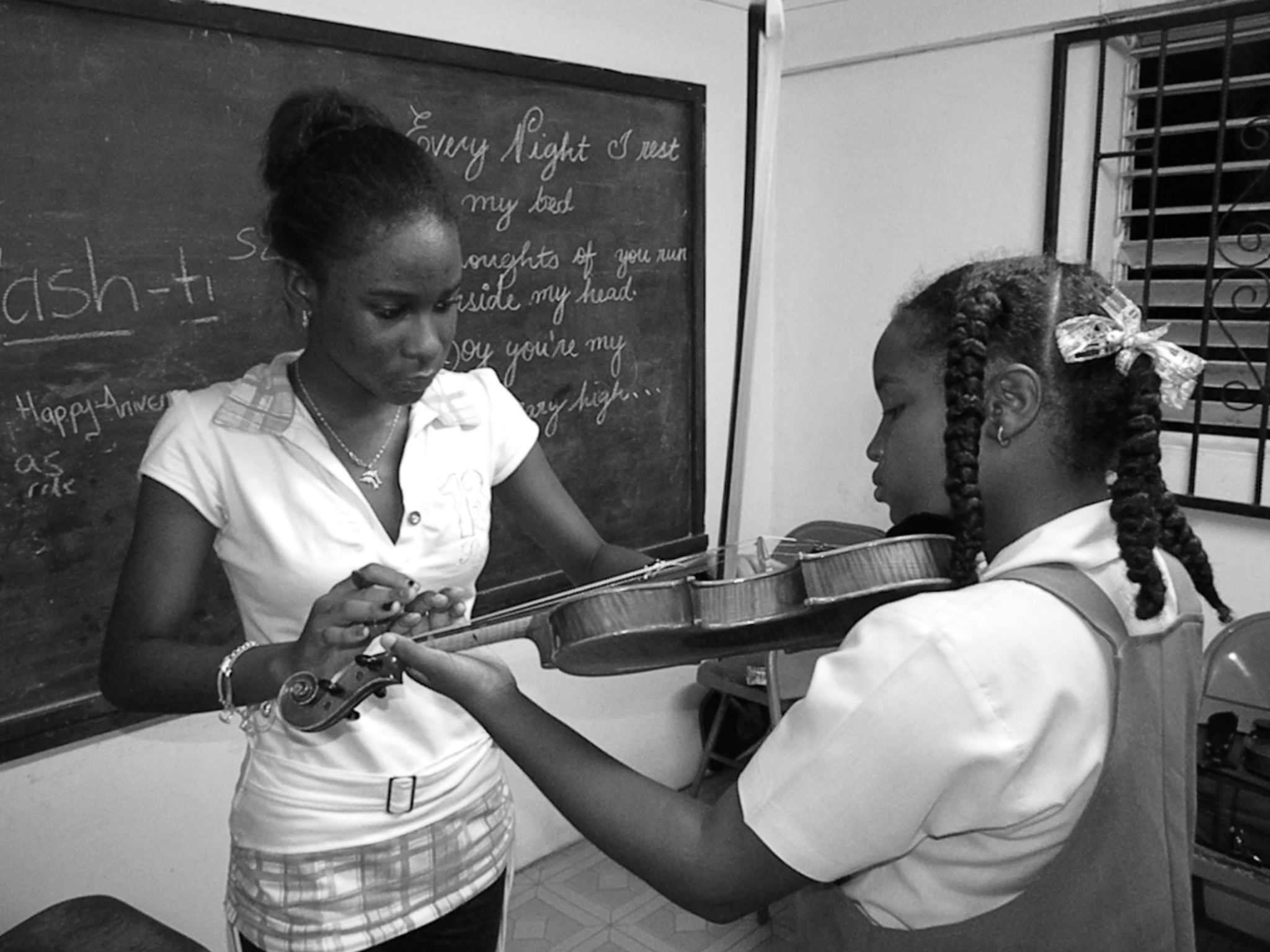Orchestras of the Americas for Social Inclusion_Organization of American States

Can Learning Music Predict Well-Being?
by Mariano Vales, OAS Music Program
SCIENCE SUGGESTS THAT LEARNING MUSIC DURING CHILDHOOD MAY PREDICT WELL-BEING IN ADULTHOOD
Throughout the years I have worked in music programs, I have witnessed the transforming power of music on at-risk children and youth. Even though I could see amazing results in their improved self-esteem and academic performance, and, more generally, a reduction in the risk factors that lead to violence, drug abuse and school dropouts, I was unaware of the mechanisms though which learning music could have such an impact on their lives. Recent scientific advances are now unveiling the nature of such processes.
In January of this year, Dr. Ezequiel Galarce, a research fellow at Harvard University, visited Washington DC to give a presentation to various departments of the Organization of American States (OAS) on our Orchestra Program for Youth at Risk in the Caribbean. The main purpose of his presentation was to summarize his preliminary findings regarding the program’s impact.
The night before the presentation, over dinner, Galarce tried to make a point: while the preliminary impact results are promising, there is recent scientific evidence that could expand our understanding of the benefits of our music program, or any music program for that matter. Music programs for children may improve a key process in their future well-being: self-control.
In the late 60’s, Stanford psychologist Walter Mischel tried an experiment at his daughters’ pre-school, utilizing their classmates as subjects. He would place a marshmallow in front of them, promising to give them a second one if they resisted the temptation to eat it for a while. He would then come back after fifteen minutes or so and check who was able to control the impulse to eat the marshmallow (self-control is the ability to control one's behavior in order to obtain a later reward).
About a decade later, chatting with his teenage daughters about their classmates, Dr. Mischel noticed that the ones who had not been able to resist temptation during the experiment were not doing so well in school. He decided then to conduct a follow-up study in which he discovered that the subjects who had shown more self-control ended up having better SAT scores and a better ability to concentrate in high-school than those who showed the least control.
Galarce also mentioned another study to further illustrate the association between early self-control and later outcomes: A gradient of childhood self-control predicts health, wealth, and public safety.This study, published in 2010 in the Proceedings of the National Academy of Sciences and led by Dr. Terri Moffitt from Duke University, followed a cohort of 1,000 children born in the late 70s in Dunedin, New Zealand, from birth to the age of 32. Results from the Dunedin experiment further demonstrated that children with better self-control were less prone to have a criminal record, be poor, have financial problems, be single parents, report poor health or incur in substance abuse as adults.
So far so good, but what does music have to do with all this? Galarce explained to me that self-control is comprised of several processes, one being the inhibitory control, or the ability to withhold a pre-potent response. This mental process allowed some of the children in Mischel’s experiment to resist the temptation of eating one marshmallow in order to eat two a short while later. He then explained that a recent study demonstrated that music training can improve inhibitory control.
This study, Short-Term Music Training Enhances Verbal Intelligence and Executive Function, published in 2011 in Psychological Science by Sylvain Moreno and others, focused on two preschool groups, one trained in music and the other in visual arts. After one month of training, the subjects (24 in each group) were administrated a go/no-go trial, which is a task in which participants either make a motor response to a stimuli (go), or withhold a response (no-go). The stimuli consisted, in this case, of a continuous stream of different shapes shown on a computer screen. Not only did music students perform better than visual arts students, but comparisons between pre- and post-test results revealed significant differences after only one month of training! What the study demonstrated is that training a high-level cognitive skill, such as inhibitory control, is possible in early childhood, and that music can be a very effective vehicle for this purpose.
In summary, the Dunedin study shows that children’s self-control skills are directly related to their future well being. The Moreno study supports the claim that music training improves the ability to withhold pre-potent responses, an essential component of the self-control. Combined, these studies suggest that teaching music to children at an early age may have a direct impact on their health and success as adults. Galarce warned me, however, that the Dunedin study is an observational study and as such no causal relationships may be established. This cautionary comment can be addressed only by testing (with a proper control group) the hypothetical link between music training’s immediate effects on self-control and its potential longer term effects on quality of life in adulthood.
His recommendation then became quite clear. It is critical to understand the impact of music programs on immediate self-control and on the various health and social consequences associated with it. If such associations can be established, we will have better tools to persuade policy makers of the transformative power music programs have on children and adolescents in vulnerable situations.

- June 23, 2011
OAS Orchestra Program takes part of United Nations High Level Working Session
› Read all - April 14, 2011
OAS Orchestra Program at Center for Latin American and Caribbean Studies at NYU
› Read all - February 8, 2011
OAS Participates in Harvard University Panel of Experts on Music Education Policies
› Read all
Haiti Relief Efforts:
Rebuilding Sainte Trinité
The Youth Orchestra Program in Haiti experienced a major setback when the Program’s host school, the Ecole de Musique Sainte Trinité, was destroyed during the 2010 earthquake.
Since the OASIS program started, Sainte Trinité served as a venue for the disadvantaged youths of Bel-Air. If we put our efforts together we can bring back the program and help rebuild the school.
› Click here to see what we are doing and to get involved.